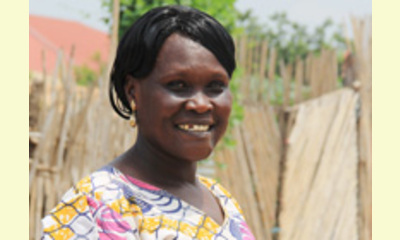|
|
South Sudanese women take the lead in local peace building
un articulo por Rebecca Fordham, UNICEF Newsline (abridged)
Juba, South Sudan – ‘Peace starts within you. If you have peace in your heart you can educate others,’ said Jennifer Kujang Abe, President of the Central Equatoria Women’s Union , during a discussion about the role of women in local conflict resolution.

Mama Joy, member of the Munuki Women Peacekeeping Team, believes the younger generation needs to understand how to live together again for peace. (C) UNICEFNYHQ/2012/Fordham
click on photo to enlarge
In South Sudan more than two decades of war and inter-communal fighting have torn apart families and communities, causing thousands of people to flee their homes into neighbouring countries and weakening traditional mechanisms for protection. Following the Comprehensive Peace Agreement (2005) and referendum on independence (2011), more than 390,000 South Sudanese have returned to their country. This movement and on-going economic and social challenges has placed further strain on communities attempting to rebuild fragile relationships.
In Munuki, on the outskirts of Juba, 15 volunteer women are meeting at the offices of the Nonviolent Peaceforce (NP) to discuss community issues and ways to address them. Together they form a Women Peacekeeping Team (WPT). The Nonviolent Peaceforce (NP) set up the first WPT in Juba in November 2011. There are now five teams covering two districts in Central Equatoria State and three districts in Western Equatoria State.
The Munuki WPT is a varied group - some are educated and skilled women who have held positions in county or state government, most are illiterate, and approximately half of the group left during the war. Many were involved in peace movements during the conflict, both inside and out of the country, but now feel marginalized. They all agree on the need for women to be part of the rebuilding process.
”The men were scattered, but we came together,” said Jennifer Kujang, who recently returned from Uganda. “My skills didn’t just come from the air. I worked with women throughout my exile and we can stand alone like men.”
The volunteer women participated in a two-day workshop, building on their communication skills and understanding of gender-based violence (GBV), domestic violence and civil disputes. They learned how to connect with the police, social workers and health service providers and how to register cases of GBV, and reporting these to the Ministry of Gender, Child and Social Welfare.
“Women often have information on the ground. They are at home and know what is going on, but they haven’t been empowered to use their knowledge,” said Tiffany Easthom, Country Director, NonViolent Peaceforce (NP). “We have seen that large-scale conflict often builds from a small dispute. It’s critical to use women’s knowledge to allow them to protect themselves and their communities,” she added. . . .
The women’s training is part of UNICEF’s broader approach to strengthen the protective environment for women and children . . .
“Being part of the team has provided me with a confidence and pride. I dress better and feel stronger within myself,” said Mama Joy, a widow with 7 children. “I am able to be a role model for my children and grandchildren.” She believes the younger generation needs to understand how to live together again for peace.
|








|
DISCUSSION
Pregunta(s) relacionada(s) al artículo :
Do women have a special role to play in the peace movement?,
* * * * *
Comentario más reciente:
:
The 30 articles in CPNN linked to this question make it clear that women indeed have a special role to play in the peace movement. See the following for an historical explanation of why this is true.

|
|









